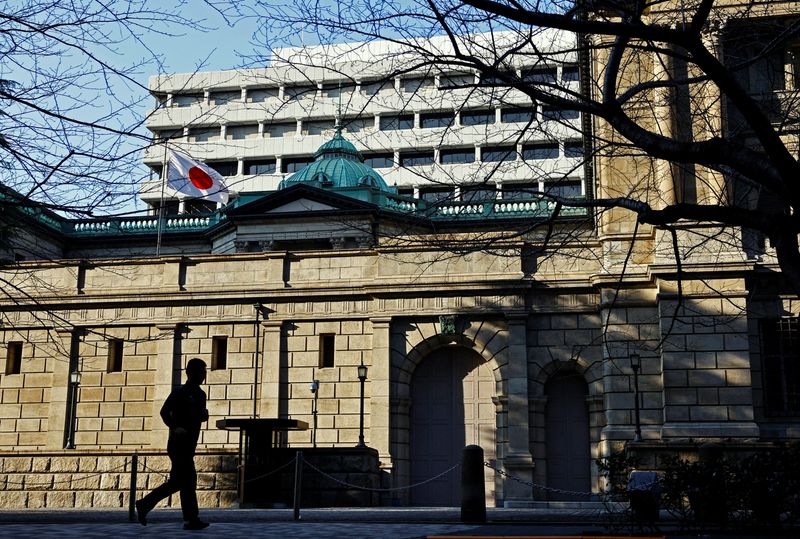Written by Laika Kihara and Makiko Yamazaki
TOKYO (Reuters) – The Bank of Japan raised interest rates on Friday to their highest levels since the 2008 global financial crisis, underscoring its confidence that wage increases will keep inflation stable around its 2% target.
The decision represents the first interest rate hike since July last year, and comes days after the inauguration of US President Donald Trump, which is likely to keep global policymakers vigilant ahead of potential repercussions from the threat of tariff hikes.
At its two-day meeting that concluded on Friday, the Bank of Japan raised the short-term interest rate from 0.25% to 0.5% – a level Japan has not seen in 17 years. It was voted on 8-1, with board member Toyuki Nakamura dissenting.
The widely expected move underscores the central bank’s intent to steadily raise interest rates to around 1% – a level analysts see as neither cooling nor overheating the Japanese economy.
“The likelihood of meeting the Bank of Japan’s expectations is rising,” the central bank said in a statement announcing the decision, as many companies said they would continue to raise wages steadily in this year’s annual wage negotiations.
“Core inflation is rising towards the BOJ’s 2% target,” the central bank said, adding that financial markets remained stable as a whole.
The Bank of Japan made no change to its forward policy guidance, saying it would continue to raise interest rates if its economic and price forecasts come true. But he removed a phrase emphasizing the need to scrutinize the risks surrounding external economies and markets.
“Their logic is still the same,” said Naka Matsuzawa, chief macro strategist at Nomura Securities in Tokyo. “They are still far from neutral, so it is natural to make an adjustment.”
“Unless the Bank of Japan changes the logic of raising interest rates, or even raises the neutral point, which they have been considering — around 1% — there will not be much room for the market to price in further hikes in the future.”
The yen rose about 0.5% to 155.32 per dollar after the decision, while the yield on two-year Japanese government bonds rose.
Attention now turns to any evidence BOJ Governor Kazuo Ueda provides in his post-meeting briefing at 0630 GMT on the pace and timing of additional increases.
In a quarterly forecast report, the Governing Council raised its price forecasts to expect core inflation to move at or above its 2% target for three consecutive years.
He also said risks to the inflation outlook are tilted to the upside amid intensifying labor shortages, higher rice prices and higher import costs from a weaker yen.
“With regard to this year’s annual wage negotiations, companies expressed many views that they would continue to raise wages steadily,” the report said.
Japan’s annual wage increases must exceed the 5.1% secured last year as real wages continue to decline, the head of a Japanese trade union group told Reuters on Friday.
The Governing Council now expects core consumer inflation to reach 2.4% in fiscal year 2025 before slowing to 2.0% in 2026. In the previous forecast made in October, inflation was expected to reach 1.9% in both fiscal years 2025 and 2026.
He made no change to his forecast that the Japanese economy will grow by 1.1% in fiscal year 2025 and 1.0% in 2026.
The report said that while the US economy was strong and financial markets were stable as a whole, the Bank of Japan should be alert to uncertainties surrounding US policy behavior.
“The increase may have been expected, but for what appears to be the first time in a very long time, there have been no significant cuts to their economic forecasts,” said Matt Simpson, chief market analyst at City Index in Brisbane.
“This leaves the door open for another 25 basis points of interest rate hikes by the end of the year, and the interest rate will remain at a whopping 0.75%.”
Core consumer inflation in Japan accelerated to 3.0% in December, the fastest annual pace in 16 months, data showed earlier Friday, a sign that rising fuel and food prices continue to push down the cost of living for households.

After taking office in April 2023, Ueda dismantled his predecessor’s radical stimulus program in March last year, raising short-term interest rates to 0.25% in July.
Bank of Japan policymakers have repeatedly said the central bank will continue to raise interest rates, if Japan makes progress in achieving a cycle in which higher inflation boosts wages and lifts consumption — allowing businesses to continue passing on higher costs.
https://i-invdn-com.investing.com/news/Brazil-Stock-Market_3_800x533_L_1414427437.jpg
Source link